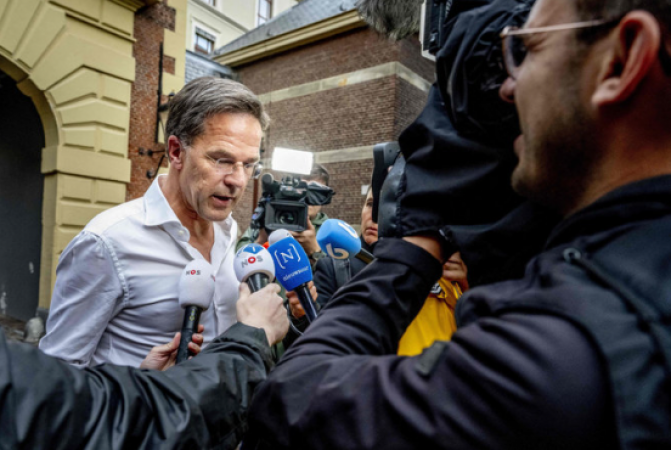
The Hauge: Due to unbridgeable disagreements within the four-party coalition over how to control immigration, a contentious issue that has polarised nations throughout Europe, the Dutch government disintegrated on Friday.
A general election will be held in the Netherlands later this year as a result of the resignation of Prime Minister Mark Rutte, who was the longest-serving premier in history. Rutte and his administration will continue to serve as the interim government until a new ruling coalition is chosen.
In The Hague, Rutte told reporters, "It is no secret that the coalition partners have very different views on migration policy. "Unfortunately, we must now come to the conclusion that these differences cannot be reconciled. For this reason, I will as soon as possible present the king with a written resignation from the entire Cabinet.
Also Read: Zelensky meets with Erdogan of Turkey to advance Ukraine's NATO bid
Before Rutte formally accepted his resignation, opposition lawmakers wasted no time in calling for new elections.
Geert Wilders, the head of the Freedom Party, which is opposed to immigration, tweeted, "Quick elections now." Jesse Klaver, the leader of the Green Left, called for elections and stated to Dutch television station NOS that "this country needs a change of direction" across the political spectrum.
Rutte had presided over late-night meetings on migration policy on Wednesday and Thursday that came to nothing. In a final round of negotiations held Friday night, all parties agreed that they were unable to come to a consensus and, as a result, could not continue to work as a coalition.
The choice highlighted the ideological differences between the two parties that support tougher immigration policies—Rutte's conservative People's Party for Freedom and Democracy and the Christian Democrats—and those that do not. These differences date back to the day the coalition was sworn in just over 18 months ago.
Similar discussions are taking place across political lines in other parts of Europe as refugees from conflict or people looking for a better life risk their lives to travel by sea from northern Africa to the continent. Thousands of people have also escaped the protracted conflict in Ukraine.
The issue of migration is expected to play a major role in the parliamentary elections for the European Union the following year, but it already made an impact in the Netherlands, a country that has long been torn between a welcoming international outreach and rising antipathy to foreign influences.
Also Read: Riyadh's success story is highlighted by Fahd Al-Rasheed at the India summit
Rutte's coalition spent months attempting to reach an agreement to lessen the number of new immigrants entering the nation of almost 18 million people. According to reports, proposals included splitting up the categories of asylum seekers in the Netherlands into two groups: those seeking temporary protection from conflict and those seeking permanent protection from those seeking to flee persecution.
Last year, as the number of people entering the Netherlands exceeded the number of beds available, hundreds of asylum seekers were forced to sleep outdoors in filthy conditions close to an overcrowded reception centre. Dutch aid organisations provided support.
In 2022, just over 21,500 non-Europeans applied for asylum there, according to the statistics office of the nation. Additional tens of thousands came to the Netherlands to work and attend school.
Housing, which was already in short supply in the densely populated nation, has been strained by the numbers.
The Rutte administration worked to enact a law requiring municipalities to house newly arrived asylum seekers, but it hasn't yet been approved by both houses of parliament.
The prime minister also supported the 27-nation bloc's efforts to slow immigration. Along with his Italian counterpart and the head of the EU's executive commission, Rutte travelled to Tunisia last month to announce a financial aid package worth more than 1 billion euros to help the country's faltering economy and reduce migration to Europe.
After the longest coalition negotiations in Dutch political history, Rutte's coalition government, the fourth he has led, was sworn in as prime minister in January 2022.
There are 20 parties represented in the 150-seat lower house of the Dutch parliament, creating a polarised and fractured political environment for the election of the lower house later this year.
Also Read: France stops bringing back large numbers of Daesh wives from Syria
Rutte's party came in second place during provincial elections earlier this year behind a populist party that supported farmers. The defeat was viewed as a potential motivator for Rutte to exert all of his efforts to keep his coalition together until its term expires in 2025.